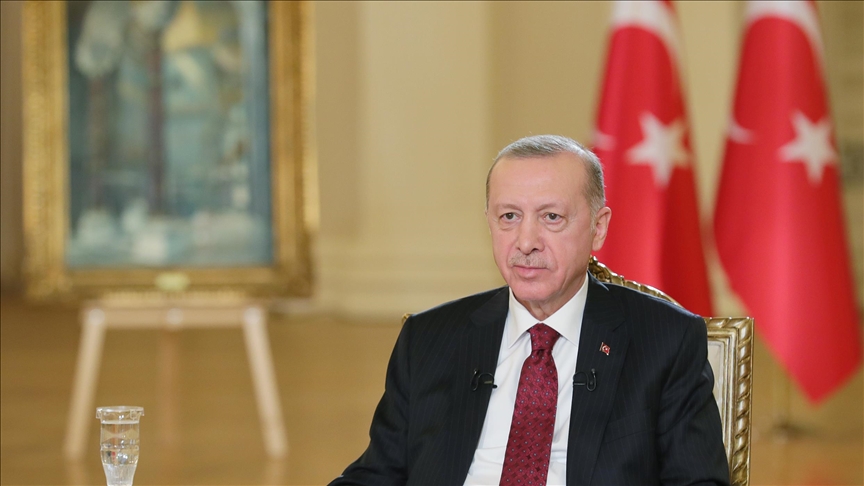Turkiye ready to host Russian, Ukrainian leaders: President Erdogan
Ankara wants tensions between Russia, Ukraine to be resolved before turning into new crisis, Turkish leader says
 Turkish President Recep Tayyip Erdogan
Turkish President Recep Tayyip Erdogan
ANKARA
Turkiye's president reiterated Wednesday that he is ready to host the leaders of Russia and Ukraine to “pave the way for re-establishing peace” as tensions between the two countries show little sign of diminishing.
"Turkiye wants tensions between Russia and Ukraine to be resolved before they turn into a new crisis," Recep Tayyip Erdogan said during a televised interview.
"I hope that Russia will not resort to an armed attack and occupation of Ukraine," he said.
Such a move, he said, could not be "rational" for Russia and the region, stressing Turkiye’s desire for regional peace and stability.
Erdogan also announced that he had invited Russian President Vladimir Putin to Turkiye, but the date is yet to be set.
He meanwhile reiterated Turkiye’s "clear" commitment to Ukraine's territorial integrity.
Russia recently amassed tens of thousands of troops near Ukraine’s eastern border, prompting fears that the Kremlin could be planning another military offensive against its former Soviet neighbor.
Moscow has denied that it is preparing to invade and said its troops are there for exercises. It has also issued a list of security demands, including that Ukraine not join NATO.
Iranian gas supply
On the disruption of gas imports from Iran, Erdogan said Turkiye was not in debt to Iran, stressing that such accusations are "lies."
The Turkish leader said he spoke to his Iranian counterpart Ebrahim Raisi about the issue. Full gas flow will resume in 10-15 days, Erdogan said.
Iran recently confirmed that it would not send natural gas to Turkiye between Jan. 21 and Jan. 31 due to a technical malfunction on the main pipeline.
Turkiye has been implementing gas cuts to the industrial sector, specifically in industrial zones and at gas power plants to ensure a favorable, supply-demand balance in the system.
On the Eastern Mediterranean (EastMed) Pipeline, a planned gas pipeline that would ferry Israeli gas from the Eastern Mediterranean to Greece, the Turkish president once again stressed that "any project that disregards Turkiye in the Eastern Mediterranean cannot be successful."
Saying that the EastMed project is "technically and commercially unfeasible," Erdogan welcomed the decision by the US to withdraw its support from the project.
As the new US ambassador Jeff Flake today presented his letters of credentials to the Turkish president, Erdogan said he believes there will be new developments in relations between Turkiye and the US following his meeting last October with US President Joe Biden in Rome.
"Talks between US officials and Ministry of National Defense officials over the F-35s are developing in a positive direction," he added.
Greece, Israel and the Greek Cypriot administration signed an agreement in 2020 to build a 1,900-kilometer (1,181-mile) natural gas pipeline in the Eastern Mediterranean that would connect Israel, the Greek Cypriot administration, Crete, Greece and ultimately Italy.
Many experts said the estimated natural gas transfer cost would be three times cheaper if the pipeline passes through Turkiye.
Although Ankara and Tel Aviv have expressed willingness to negotiate on such gas transfer via Turkiye, talks have never gotten off the ground.
In that regard, Erdogan expressed his country's readiness to take "all means of steps" in such area.
He also announced Israeli President Isaac Herzog's likely visit to Turkiye in early February, adding it could pave the way for a “new era” in relations between the two countries.
Relations with Gulf countries
Saying that Turkiye has achieved "a good momentum in relations with the Gulf countries," Erdogan noted that his country's "principled and well-intentioned attitude towards the Gulf region" is being better understood.
He further cited the "strong cultural, economic ties" with the region, adding Ankara prioritizes dialogue and consensus.
"We will make the best of this serious cooperation potential," he added.
Touching on his forthcoming visit to the United Arab Emirates in February, Erdogan said "Feb. 14 is an important date for us. Hopefully our visit to the UAE on this date will be the beginning of a new era."
The Turkish president also announced the extradition of a suspect linked to the murder in 2002 of a Turkish scholar researching the Fetullah Terrorist Organization (FETO).
Nuri Gokhan Bozkir, who was sought with a red notice for the murder of Necip Hablemitoglu, was caught in Ukraine and Turkiye asked for his extradition, Erdogan said.
"Additionally to his FETO links, he (Bozkir) is known to supply weapons and ammunition to Daesh," Erdogan added while noting that he is currently being interrogated in Turkiye.
Hablemitoglu, known for his research and books on FETO, was killed in front of his house in the Turkish capital Ankara, but the murder was never solved.
FETO and its US-based leader Fetullah Gulen orchestrated the defeated coup of July 15, 2016 in which 251 people were killed and 2,734 injured.
Ankara also accuses FETO of being behind a long-running campaign to overthrow the state through the infiltration of Turkish institutions, particularly the military, police and judiciary.








